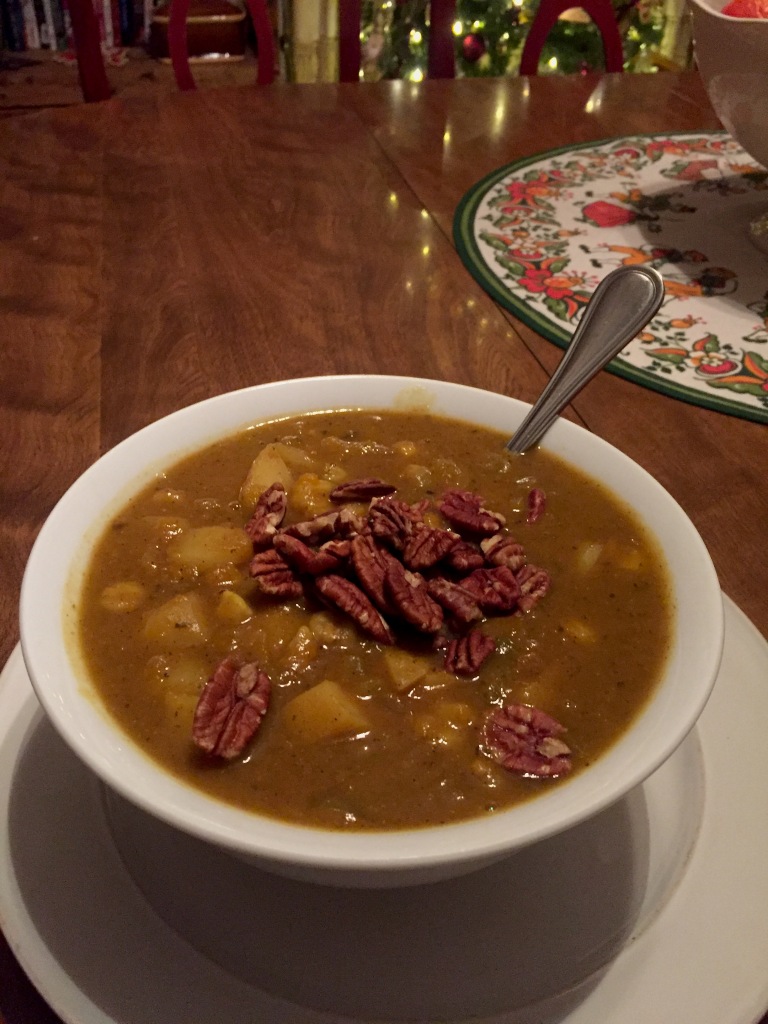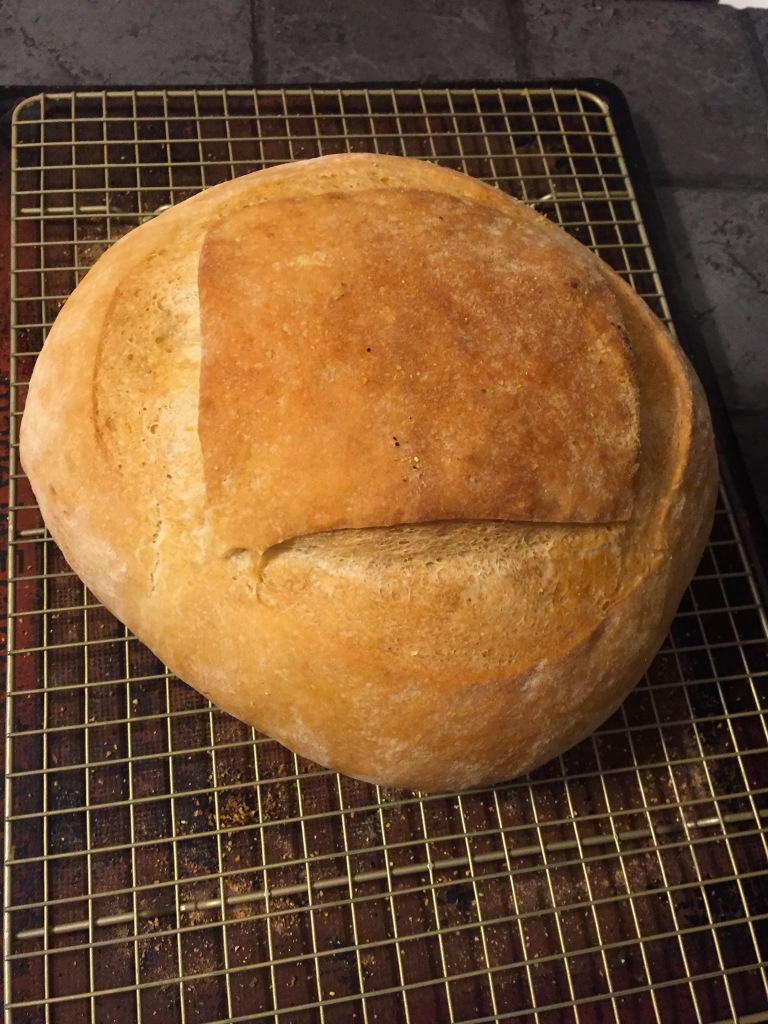The best food is the food you or your children make by yourself.
— Mohammed
in Tolstoy’s Calendar of Wisdom for 11 December
Sunday is cooking day in my house. I am off work and so have a whole day to do the long tasks. Conversely, on workdays it’s very difficult to make time for much of anything in the kitchen beyond heating up something. So I bake my bread, ferment my yogurt, make hummus if I want that, and create a pot of something. Then, I eat this stuff all week. This makes for a relaxing Sunday doing things in the kitchen — and also getting the house-cleaning and most of my writing done. I sometimes go to concerts or plays, but most Sundays are spent being a homebody.
This makes all the kitchen work much easier. I spend much less time on cooking — and clean-up, which is the biggest time-sink in the kitchen — than I would if I had to cook something for dinner every day. It is also the easiest way to use local, real food that doesn’t involve a lot of meat. I doubt you will ever find a cookbook advising you to cook like me, but that is because cookbooks all want to sell you something — at least the book — and this way of managing food is not very effective marketing.

Food’s hot, brown, & plenty of it
I don’t spend much money on ingredients. I grow quite a lot of veg and herbs myself. I buy fruit and veg in bulk when things are in season, and therefore cheap, and then store the produce with what I’ve produced. Nuts and grains and dried beans I buy in the bulk section of my food co-op as needed, though I try to hit the member sale days and buy a lot for storage. I don’t buy meat which, I think you’ll find, is the biggest chunk of the weekly grocery bill for many folks. I know it was for our household when I was cooking for carnivores. Meat also takes up the most time because it mostly has to be done daily and because it makes a mess.
But the second biggest food budget item was stuff that came from elsewhere or that required quite a lot of energy inputs to grow locally. So, fresh tomatoes in winter. Strawberries for Valentine’s Day — really, any berry in winter. Avocados and mangoes any time of the year. Bananas ought to cost more, except we subsidize them heavily — and have since the 19th century. All these things are ridiculously expensive for what you get. Which is, if we’re being honest, not very flavorful or nutritious food. (For most things, taste and nutrition are related, by the way…)
I also don’t spend much on either tools or cooking energy. I don’t have a microwave or a double oven (though there are autumn days when I think the latter would be really useful…). I don’t need a dishwasher. I tend to use one pot for most dinners. And I have a rather religious devotion to my oatmeal pot. I’ve been using it daily for just that for decades; it makes great breakfast every time. I have a large selection of baking pans, but I really use just the sheets and the occasional muffin tin. I do, however, use my Silpat sheets heavily. This saves on clean-up by eliminating sticking, but it also keeps my pans in better shape so I don’t have to replace them and eliminates both the cooking spray (empty calories largely derived from petroleum-soaked corn oil) and the parchment (which, I’ll be frank, I’ve not a clue what that stuff actually is… somehow don’t think it’s actual parchment, which is sheep skin… probably oily wood pulp of some variety…). I don’t get very brown bottoms on my baked goods, but then I don’t often bake things that need crisp, brown bottoms — cookies and so on.

Ignoring the bread… on top of the fridge where it’s comfortably warm
I mostly just bake bread and that requires… almost nothing. You want to know the secret to baking really great bread? Ignore it. Put all the things that go into bread in close proximity. Knead them together until the dough is warm enough for the little critters to work their wonders. But then don’t touch it much until it looks like you have a good amount of air in your dough. That air means there has been plenty of flavor-producing fermentation. It also means the dough will have lots of internal surfaces that both distribute heat and facilitate interactions with that heat. Edge effects. But if you’re folding it a lot or constantly moving it around so that the temperature around the dough is variable, you’re just annoying all the critters… making bad bread… Because basically, you aren’t making bread, they are. So make them happy by leaving them alone. (Forgetful people make pretty good bakers… I’m quite sure this is how bread was invented, you know…)
We have all these cookbooks, food television, food websites, food magazine, food promotion whatevers not to help us cook healthy delicious food. All this advice is marketing. It is all telling us to buy as much as we can — from the books and advice to ingredients and tools to the ultimate money-maker, processed and prepared foods. Which are not very food-like…
That’s what annoys me. All this marketing is not meeting our needs for food. It’s making money for someone else. Nobody in a corner office will ever get rich — or even have that corner office — off of local and simple food, prepared with as little effort or energy as possible. And what we get for our excess expenditure and extra efforts is just that — excess expense and extraneous work. Make no mistake, there is no “time-saving” food prep thing that takes up less time, costs less, and produces tastier, healthier food than just spending most Sundays baking bread and cooking up a pot of something for the week. Following the marketing advice makes your life more expensive and less fulfilling, all while usually making more work — for you if you prepare it all yourself, for many others if you eat ready-made stuff.
We’re told that we like variety, that nobody likes to cook, that we want fatty and sugary foods — because those are easily preserved and shipped from elsewhere. But really, how much joy do you find in preparing a fancy meal with lots of fiddly instructions, lots of inconvenient ingredients, lots and lots and lots of clean-up? Do you even get to eat that meal while it’s hot? And for those of you who rely on someone else to cook for you, do you notice the work that goes into your dinner? Do you notice your dinner most days? Would it be any different if you had a bowl of good stew every night? Probably not. Because humans actually don’t like change all that much. We are boring creatures. Well, all creatures are. Because boring works. Every time. Reliably. It’s how you meet your needs — whether for nutrition or pleasure — with the least effort and the least chance of things going wrong.
We get enough variety from seasonal changes. We gorge ourselves on tomatoes when they are freshly ripened under the summer sun. And then we get tired of tomatoes and don’t even crave them until they’re ripe again next year. Seasonal variance is about as much meal variety as we need or want. We don’t actually like to eat something different each day; we want to repeat what was good yesterday for as long as it’s still good.
But a freshly roasted potato straight from your garden isn’t making anybody rich — even though it makes you immensely happy when you get to eat it. Every day. For weeks! But our food industry is just like any other industry. It’s not there to make us happy. It’s there to make other people wealthy, usually at the expense of our happiness.
So spend your Sundays cooking simple, local food. It is not only going to make you happy, it’s better for the world. Because, of course, all that excess expense is directly proportional to the energy and resources and transport that goes into your food. Food is a hugely extractive industry. How else would it be generating money?
So want to make a difference? Spark some real change? Then cook for yourself! Spending Sundays cooking yummy, nutritious food is the ultimate in subversive acts. You’ll be a radical activist and you’ll never have to leave the house or sit out in the cold and wet. (Never mind chaining yourself to fences or lying on the courthouse steps in body bags… ahem…) And you get to eat this…

Mmmmmm! Warm bread!
For the curious, this week’s pot of something is a butternut squash and green chile stew with corn, beans and roasted potatoes. Most of which did not get eaten when they came out of the oven…
The bread is ciabatta. It’s making the house smell heavenly.





